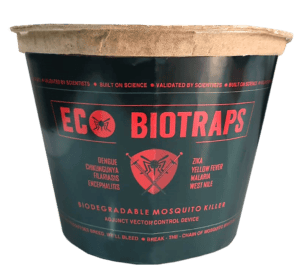 In the quest to combat mosquito-borne diseases and create a sustainable solution, Prasad Phadke, with a rich background in global technology leadership, founded Eco BioTraps. His visionary approach, backed by over two decades of expertise with renowned brands like NVIDIA and Autodesk, has propelled Eco BioTraps into a socially impactful initiative. This article delves into the innovative strategies, environmental sustainability, community impact, and future plans of Eco BioTraps, shedding light on its journey towards global recognition and effectiveness in saving lives.
In the quest to combat mosquito-borne diseases and create a sustainable solution, Prasad Phadke, with a rich background in global technology leadership, founded Eco BioTraps. His visionary approach, backed by over two decades of expertise with renowned brands like NVIDIA and Autodesk, has propelled Eco BioTraps into a socially impactful initiative. This article delves into the innovative strategies, environmental sustainability, community impact, and future plans of Eco BioTraps, shedding light on its journey towards global recognition and effectiveness in saving lives.
Can you provide more details about the inspiration behind the creation of Eco BioTraps and the journey of its founder in developing this innovative solution?
Prasad Phadke’s extensive experience in leadership roles with global technology brands ha profoundly influenced the development and growth of Eco BioTraps. With over 20 years of expertise in building global brands like 3Dlabs, Autodesk, NVIDIA, and Hewlett Packard in South Asia and the Americas, Prasad brought a wealth of knowledge and strategic acumen to Eco BioTraps. His track record of creating impactful experiences for brands and scaling successful businesses in both technology hardware and software sectors have provided a strong foundation for Eco BioTraps. His ability to build relationships with influential figures and his recognition by organizations like the Federation of Indian Chambers of Commerce & amp; Industries (FICCI) and CMO Asia signify his influence and credibility in the industry.
By founding EcoBio Inc as a for-profit social enterprise, Prasad harnessed his leadership skills and industry insights to tackle significant public health challenges. His background in technology and marketing has likely informed the innovative strategies employed by Eco BioTraps, ensuring that the venture not only develops groundbreaking solutions but also effectively markets and scales its impact. Prasad’s unique blend of leadership, relationship-building, and strategic vision has undoubtedly played a pivotal role in shaping Eco BioTraps into a socially impactful and globally recognized initiative, saving lives from mosquito-borne diseases. The inspiration and motivation behind founding Eco BioTraps (EBT) can be traced back to the summer of 2017 when Prasad Phadke, after quitting his corporate job, embarked on a venture to address a significant public health concern. Fueled by a keen awareness of the persistent issue of mosquito-borne diseases like dengue, malaria, and chikungunya, Prasad collaborated with scientists and like-minded individuals to develop a solution. The pivotal moment occurred while sitting at a restaurant in San Francisco, where they observed a high prevalence of mosquitoes despite advancements in science and technology. Additionally, reports of West Nile virus cases in the area highlighted the urgency of finding an innovative and sustainable solution.
Recognizing the need for a method to break the chain of mosquito-borne diseases, Prasad and his team set out to create a device specifically tailored for tropical regions, where these diseases are rampant. They aimed to bridge a clear gap in the market by innovating and building a biodegradable device that could effectively reduce mosquito populations. The goal was to develop a sustainable way to disrupt the breeding cycle of mosquitoes, thereby curbing the incidence of diseases they carry.
After two years of intensive research and collaboration with renowned entomologists, Eco BioTraps
(EBT) was born. Eco BioTraps is a population reduction device designed to break the chain of mosquito breeding and prevent diseases like dengue, malaria, chikungunya, zika, and other vector-borne illnesses. The device’s development was not only grounded in scientific rigor but also gained validation from some of the world’s top entomologists, including Dr. Susanta Kumar Ghosh, former head of ICMR; Dr. Subhash Salunk, an ICMR member; Dr. Neeraj Dhingra, former Director of National Vector-borne Diseases Control Program; and Dr. Altaf Lal, the Director of Malaria Elimination Demonstration Project Board Member.
Officially incorporated in July 2019 under the EcoBio Group, Eco BioTraps has presence in Ahmedabad, Mumbai, Delhi and manufacturing in Pune. The innovative approach of Eco BioTraps not only addresses the immediate problem of mosquito-borne diseases but also reflects a pioneering effort to create a sustainable and biodegradable solution, making significant strides in public health and environmental conservation.
In what ways does Eco BioTraps align with environmental sustainability, and how does the company contribute to ecological well-being?
Eco BioTraps utilizes biodegradable containers made from recycled corrugated boxes, commonly used in the packaging industry. These containers are designed to hold water for 4-6 weeks, after which they become ineffective. It operates within an area of 400 sq feet, and is 70% cheaper than all the products in the market.
Eco BioTraps uses a proprietary natural attractant, derived from plant-based animal food. The exact details are kept confidential for proprietary reasons. This attractant lures female mosquitoes to lay their eggs in the container, believing it to be an ideal breeding site.
A Govt of India approved, industry-standard household insecticide Insect growth regulators (IGRs) is used as the cidal ingredient. These IGRs disrupt the development of mosquitoes, preventing the emergence of adult mosquitoes from eggs, thereby breaking- the-chain of mosquito breeding.
How Eco BioTraps Works:
Just add water to the EcoBioTraps, set it directly away from sunlight and forget it. Replace after every
4 weeks.
Distinctive Features and Advantages:
100% Biodegradable
No Fumes
No Electricity
No Batteries or recharging
Could you elaborate on the specific challenges that Eco BioTraps addresses in comparison to traditional mosquito repellent methods?
Eco BioTraps (EBT) operate on a sophisticated yet simple mechanism, designed to specifically target female mosquitoes, which are responsible for transmitting diseases to humans.
Understanding the mosquito’s life cycle was crucial in developing an effective solution. Female mosquitoes have a short lifespan of 15 to 30 days and breed only in water, laying around 500-1,000 eggs in their lifetime. Effectively 1 mosquito bite results in creation of 31 million Mosquitoes. The rate at which mosquitoes multiply beats covid hands down and when you have such a massive multiplier, the covid science taught us that you need to Break-The-Chain of the multiplication, in case mosquitoes figure a way out to Break-The – Chain of mosquito breeding.
The current proactive solutions either i) repel the mosquitoes away (shifting the problem) or kill the adult mosquitoes without assuring if you have killed the male or female. There is no solution that proactively breaks the chain of mosquito breeding ( their multiplication factor) and Eco BioTraps plugs this gap by mimicking the ideal breeding ground for female mosquitoes and ensuring that once the eggs are laid, no adults emerge.
The current products available in the marketplace repel mosquitoes – make them run away only for them to come back. Current repellent products may emit fumes that might be hazardous to health. Fogging is an eyewash, and it does not work. EcoBioTraps is very different from these products.
Eco BioTraps is made by recycling corrugated boxes. The containers can hold water for a limited period, after which they become ineffective. The water inside the traps is non-toxic and can be safely discarded without any special processing. Eco BioTraps uses a proprietary natural attractant, derived from plant-based animal food. The exact details are kept confidential for proprietary reasons. Once its shelf life comes to an end after four to six weeks (marked by water leakage), the used unit of Eco BioTraps should be treated as dry waste and recycled accordingly. Eco BioTraps is the only device on the planet that is made from waste to save lives. Eco BioTraps uses recycling waste, specifically corrugated boxes, to create biodegradable traps designed to disrupt the breeding cycle of mosquitoes. By doing so, they actively contribute to environmental sustainability. Simultaneously, their innovative traps help prevent mosquito-borne diseases like Dengue and Malaria, promoting public health.
This dual approach of waste recycling and disease prevention embodies their social impact goals, making a positive difference in both environmental conservation and community well- being.
Till date Eco BioTraps have protected 944,000 lives, reduced carbon offset by 170 metric tonnes and diverted 70 sq feet of landfill. Each Eco BioTraps unit lasts for 4 weeks, is effective up to 400 sq feet, and 70% cheaper than all the products in the market.
How has the community responded to Eco BioTraps, and what impact has it had on the areas where it has been implemented?
Eco BioTraps are very easy to deploy and need zero training, no fuel, no capital expenditure and only once a month replacement. Just place Eco BioTraps directly away from sunlight and add water to the device. Replace every 4 weeks. Ease of use , no fuel and no capital expenditure are the USPs on why communities are able to readily deploy it without trained manpower.
Eco BioTraps has been working closely with the Brihanmumbai Municipal Corporation (BMC) in Dharavi, Mumbai, one of the world’s largest slums. In partnership with the ICICI Foundation, Eco BioTraps have been deployed in this challenging environment, resulting in impressive outcomes. In the last 18 months, we have been actively working in Dharavi, a region historically topping the charts in dengue and malaria cases during each season. However, this year, Dharavi has notably been absent from the top 10 list of areas most affected by dengue or malaria, showcasing the positive impact of our efforts.
About two months ago, a defence establishment in Karnataka reported approximately 50 cases of dengue. Collaborating with our partner Rentokil PCI, we deployed our Eco BioTraps, resulting in a remarkable reduction in the case-load from 50 to just 5 within a month. The proactive use of our product prevented a potential surge to 200 cases, and by the subsequent month, there were no new reported cases.
Additionally, the Kalyan-Dombivli municipal corporation, facing 40 dengue cases, sought our assistance. After the strategic placement of Eco BioTraps, the caseload was significantly reduced to only 3 cases, with only 5 new cases emerging, thereby preventing the predicted escalation to 200 cases.
At this year’s National Social Innovation Conference held in Pune (brain child of Dr RA Mashelkar- India’s Science Man”, Eco Biotraps emerged as a winner out of the 200+ applications for our innovation and impact in the urban area.
Are there any ongoing research and development initiatives within Eco BioTraps to enhance its effectiveness or expand its applications?
While the company has focused on eliminating the mosquito problem at the root by ‘Breaking the Chain’ and preventing the breeding cycle of female mosquitoes, in the future it plans to carry out disease surveillance too. Disease surveillance in this context would mean identifying and targeting ‘mosquito hotspots’ around the world so that diseases like dengue, malaria and zika can be promptly averted before they become epidemics that claim millions of human lives.
Can you shed light on the scalability of Eco BioTraps and its potential for broader adoption, especially in regions heavily affected by mosquito-borne diseases?
Scalability hinges on two pivotal factors: affordability and availability. Our commitment to affordability is evident in the compelling statistics showcasing our cost-effectiveness compared to competitors. We have consistently outperformed the market, offering a budget-friendly solution without compromising quality as our products are 70% cheaper than all the other products in the market.
In terms of availability, our reach extends far and wide. You can find our products not only on Amazon, ensuring seamless accessibility to a global audience, but also through Rentokil PCI, with a robust presence across 1000 locations spanning 300 districts in 22 states. This extensive coverage underscores our dedication to making our solutions readily available, ensuring comprehensive scalability across the diverse landscape of India.
Various prestigious establishments, including Marquee Hotels, Hospitals, Residential Societies, Defense establishments, Schools, Educational institutions, IT Parks, and Manufacturing Companies, have opted for year-long contracts with Eco BioTraps. The company is committed to delivering customized, top-notch solutions, guaranteeing a secure and pest-free environment for all their clients.
What partnerships or collaborations has Eco BioTraps established to further its mission and objectives?
- Eco Biotraps is a registered incubatee at SMILE ( Brihanmumbai Municipal Corporation’s Incubator).
- Available through Rentokil PCI at 18002122125, Eco Biotraps has been made available in 1000 locations across 300 districts and 22 states.
- We have recently tied up with a Ladli Foundation, a leading grassroots non-profit known for implementing impactful and innovative social initiatives to provide equitable healthcare, education & life skills to uplift vulnerable women.
Our mission is ambitious—reaching every government school and Anganwadi, leaving a lasting impact on communities across the nation. We trust through this collaboration, we can reach out to the last-mile delivery and make a bigger difference. Maternal & child health is the utmost priority and this partnership can play a crucial role in ensuring the safety and well-being as well as contributing to a healthier and safer future for all.
What measures does Eco BioTraps take to continuously improve its products based on user feedback and emerging trends in mosquito control?
Eco BioTraps employs robust systems to collect feedback from users through surveys, customer support channels, and online reviews. We actively encourage users to share their experiences and suggestions, fostering a collaborative relationship.
Recognizing the significance of safety in mosquito control, Eco BioTraps has implemented a safety net based on user feedback. This safety net serves as a protective measure addressing concerns raised by users, ensuring the products are not only effective but also safe for use.
Eco BioTraps conducts rigorous and ongoing product testing to identify any potential issues or areas for improvement.
The company prioritizes user education by providing comprehensive and user-friendly instruction manuals accompanying its products.
Flexibility in product design and formulation allows the company to adapt quickly to new trends, incorporating cutting-edge technologies for improved efficacy.
We engage in collaborative efforts with experts in mosquito control, benefiting from their specialized knowledge to refine existing products and develop innovative solutions.
Considering the global nature of mosquito-borne diseases, how does Eco BioTraps strategize its market expansion and outreach efforts?
Eco BioTraps is poised for significant expansion in the middle of the next year, targeting three
international locations in South and Southeast Asia: Malaysia, Nepal, and China. This strategic move marks a pivotal step in Eco BioTraps’ global growth journey, enhancing its presence and impact in key markets across the region.







